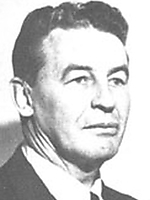|
| Affiliation | Progressive |

|
| |
1952-01-01 |
|
|
| Name | Vincent W. Hallinan |
| Address |
San Francisco, California , United States |
| Email | None |
| Website | None |
| Born |
December 16, 1896
|
| Died | October 03, 1992
(95 years)
|
| Contributor | Thomas Walker |
| Last Modifed | RBH
Nov 17, 2018 01:38am |
| Tags |
Irish - Married - Navy - Disbarred - Imprisoned - ACLU - Atheist - Straight -
|
| Info | Vincent William Hallinan, who died Oct. 3, 1992 at the age of 95, was a founding member of the San Francisco Chapter of the National Lawyers Guild. In 1920 he was San Francisco's youngest practicing attorney. When he died, he was the city's oldest active lawyer.
The following is excerpted from the eulogy of Vincent Hallinan by his son, Conn M. Hallinan:
For my father, being a lawyer was the defining truth of his life. Not the law in the abstract, mind you, but the roar of courtroom battle. Indeed, he never thought of judges, opposing lawyers, or prosecutors as "colleagues." He was not polite. He punched out more than two dozen opponents in his time--what he called "settling out of court"-- and gathered seven contempt citations, spending a fair amount of time in prison for the latter. He didn't try cases, he waged war.
My father's Irish roots played no little part in this. I say this with a certain hesitation, since "Irish=fighting" is a distasteful stereotype. Distasteful, maybe, but nonetheless true. You can't fight a war of resistance for 823 years and not develop a world view in which the love of a good scrap isn't part of the package.
His father, Patrick, was a member of the Invincibles, a revolutionary organization that assassinated the Lord Mayor of Dublin and his secretary in 1881, the infamous Phoenix Park Massacre. He fled to the U.S. and became a street car conductor in San Francisco. My grandfather was also one of the leaders of the Great Front Strike of 1899-l900, the precursor of the l934 general strike.
What my father discovered early on -- what generations of Irish had discovered down the years -- was that fighting worked. If you put your head down and punched, people stopped calling you a "dirty Heenie" or a "dumb Paddy." For Vincent, it would define his relationship to the world.
But my father was not just a fighter, he was an innovator. He always felt that his one real contribution to the law was in the area of opening statements. He also had a firm belief that anyone could become an expert on anything, and that winning cases was 95 percent perspiration, 5 percent inspiration. While he had a reputation for eloquence, it was his careful and meticulous preparation that won cases.
He specialized in criminal law, and his rap sheet read like a Dashiell Hammett series: The Windmill Murder case, the Frank Egan trial, the Irene Mansfeldt murder. His greatest battle, however, was against the U.S. government in defense of Harry Bridges. "In the Bridges case I learned more about justice and its perversion than I did in 50 years of prior practice and 30 years since," he said. He fought his way back into the Bar when he got out of McNeil Island prison for contempt of court in the Bridges case, and continued to fight for justice.
In his book, A Lion in Court, he recalls the day he was released from McNeil Island: "I stood on the boat watching the grim citadel, a monument to man's inhumanity to man, receding in the morning mist as I moved toward freedom. "At least, you son of a bitch, I thought, you're a better place because I went through you." I think that's a closing argument most juries would buy.
[Link] |
 | BOOKS |
 |
|
| Title |
Purchase |
Contributor |
|
| Start Date |
End Date |
Type |
Title |
Contributor |
|
| Date |
Category |
Headline |
Article |
Contributor |
|
 | INFORMATION LINKS |
|
|
|

